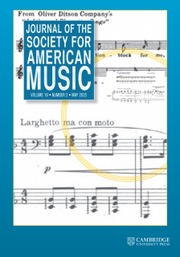Article contents
Aaron Copland and the Politics of Cultural Diplomacy
Published online by Cambridge University Press: 13 July 2011
Abstract
Scholars have largely ignored Aaron Copland's lengthy career as a cultural diplomat, although the documentation surrounding it sheds new light on his political views. Through a consideration of his work with the U.S. government during World War II and the Cold War this article argues that a brand of universalist internationalism, rooted in his earlier musical experiences in Europe and in his leftist politics, motivated many of Copland's political activities at home and overseas during this period. Copland remained committed to this perspective both before and after his McCarthy hearing in 1953, but the Cold War inevitably brought new challenges to a man with such an outlook. Copland's work with the U.S. Information Agency during this period shows that although his beliefs and attitudes remained unchanged, he felt the need to participate in a reconstruction of his image that better matched the new climate. His music written during the Cold War, furthermore, provides an artistic realization of this interaction between pragmatism and idealism.
- Type
- Research Article
- Information
- Copyright
- Copyright © The Society for American Music 2011
References
References
- 5
- Cited by


